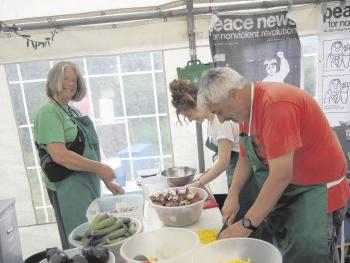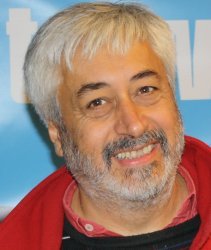 Howard's sudden death has left us shocked and bereaved, and with an irrational sense of outrage that he has left us so unexpectedly. He was only 63 and in the middle of helping organise next summer’s WRI conference in South Africa. He leaves a gap which others must strive to fill. It will be difficult, and the following overview and appreciation of his life as a peace activist, organiser and researcher will give some indication of the scale of the challenge.
Howard's sudden death has left us shocked and bereaved, and with an irrational sense of outrage that he has left us so unexpectedly. He was only 63 and in the middle of helping organise next summer’s WRI conference in South Africa. He leaves a gap which others must strive to fill. It will be difficult, and the following overview and appreciation of his life as a peace activist, organiser and researcher will give some indication of the scale of the challenge.
But before reviewing his life and work, let us try to colour the picture. In recent years he was recognisable as a big and incredibly energetic man who tended to look at you rather side-ways on because of his ‘wobbly eyes’ condition (nystagmus). When speaking he often had a nervous giggle, which could be transformed into a loud laugh when relaxing with friends. In several ways he shared a background with the mainstream tradition of British pacifists: born into a devout Methodist family (his father was a minister), a vegetarian, a tee-totaller and never interested in drugs. Beyond that he had great reserves of energy and enthusiasm, he loved sport of all kinds (but especially Manchester United). He also had an amazing memory – he could remember names and faces, and the locations where people had met and, very often, what they had said on such occasions. A number of close friends and colleagues feel they have lost a part of their memory bank with his death!
But he was no saint – he was a warm and contradictory human-being, who delighted in laughter and gossip. If you wanted to keep something restricted to a limited group, the maxim was, ‘Don’t tell Howard!’ He had a wonderful generosity of spirit, and gave freely of his time and knowledge, reading and commenting on people’s drafts and work in progress, drawing on his amazing range of experience and expertise. He could also be scathing in his judgement (and dismissal) of people who fell short in some way or another – any display of hypocrisy could drive him to outrage, accompanied by much waving of the arms in exasperation. More often, however, the gossip was good natured - he could laugh at his own and others’ contradictions and subterfuges. At a meeting to celebrate the life of a deceased colleague on the Alternative Defence Commission (ADC), Walter Stein, he recounted how Walter had accused him of trying to smuggle pacifism into a condensed version of its report which he had been working on. “That was exactly,’ he said laughing, ‘what I had been doing!’
He was insightful when it came to judging how others were feeling. The US pacifist, and former chair of WRI, David McReynolds, in a recent letter on hearing of Howard’s death recounts an occasion during a WRI Council meeting when he was feeling depressed following the death in his absence of his mother during the Triennial conference in India in 1985. ‘Howard came over to the table where I was sitting while finishing dinner and asked if everything was alright. It wasn’t, of course…. But I really appreciated his sensing something was very wrong.’
He had begun to define himself as a pacifist in 1968, the year he went to university. He had fallen in love with - and was married for a time to - Penny Strange whose father had been a conscientious objector in the Second World War. Up until then Howard had believed that in theory there might be situations where it would be justifiable to go to war, but he now concluded that there were too many unknowns to make such a call. From that time on he devoted himself to struggling against the causes of war and exploring nonviolent means of pursuing peace and justice.
He graduated from university in 1971 and was offered a position as co-editor of Peace News. By that time he was a member of the National Council of the Fellowship of Reconciliation but was soon attracted to the more secular pacifism that was characteristic of those around Peace News. He remained co-editor until 1976 and it was during this period that he helped launch a number of campaigns and organisations including London Greenpeace, the British Withdrawal from Northern Ireland Campaign, Campaign Against the Arms Trade and the ‘At Ease’ counselling service for troubled service personnel. He was also one of the key movers behind the transfer of Peace News to Nottingham in 1974.
At that time a dominant focus within Peace News was the politics of lifestyle, sexual politics, feminism, free schools, cooperatives and alternative technology. And when Howard left the staff of the paper in 1976 to move to York he threw himself into grass-roots campaigning around these issues. He was a member of the editorial collective of York Free Press, active in the local Anti-fascist Alliance and involved in an anti-sexist group. He became a founder-member of the York Safe Energy group and was an active campaigner against nuclear power, which reached its peak in May 1979 when he was coordinator of nonviolent training for the occupation of the Torness Nuclear Power site in East Lothian. He followed that up with a solo cycle tour round all the UK nuclear power sites.
In 1980 Howard moved to Bradford where he registered for a postgraduate degree and worked as Michael Randle’s assistant in the Alternative Defence Commission that produced the report, Defence without the Bomb (1983). Howard was mainly responsible for drafting a condensed version of the report, It was during this period that he also helped write the Peace News/CND publication Preparing for nonviolent direct action which was published in 1983, the same year that he was one of the coordinators of nonviolent training for the blockade of the nuclear weapons factory at Burghfield.
Then in 1985 he landed his dream job – working for War Resisters' International in their London office. One of his first responsibilities was to coordinate the planning of the triennial conference to take place in Veddchi, Gujarat, in December 1985. Amongst the invited participants at that gathering were people from the End Conscription Campaign in South Africa with whom Howard, wearing his WRI hat, collaborated closely. In 1986 he visited Poland for the first time and encountered activists from the Freedom and Peace Movement in Poland (Wolnosc i Pokoj—WiP). Their imaginative actions (like ‘roofing’ – climbing to the top of buildings to display banners) and their subversive humour remained an abiding source of inspiration to Howard. His partner at the time, and over a period of several years, was a young woman of Polish extraction, Lisa Zychowicz, who had accompanied him to Poland. ‘It seems where my heart is,’ he observed later, ‘has influenced my life quite a lot.’
During 1990-91 the conflict in Yugoslavia was intensifying. Howard, on behalf of WRI, had already worked with conscientious objectors in Slovenia and throughout 1991-92 he travelled regularly to Croatia, Serbia and Kosovo supporting the anti-war groups that had formed there. It was during these visits that Howard became so impressed with the civil resistance movement in Kosovo and which led, eventually, to the publication of several seminal works such as Civil Resistance in Kosovo (Pluto, 2000). In 1993 Howard worked with Christine Schweitzer in developing the Balkan Peace Team Project that sent its first group of volunteers to Croatia in 1994.

Photo: Milan Rai
1994 was also the year of the WRI’s triennial in Brazil – a significant move indicative of the efforts Howard and others had been making to broaden the scope of its network beyond the traditional heartlands of Western Europe and North America. Indeed, when he died Howard was working on the preparations for the next WRI conference in July 2014 which will be held in South Africa.
In 1997 Howard became an Honorary Research Fellow of the Albert Einstein Institution in Cambridge, Massachusetts, founded by Gene Sharp. In the same year he resigned from his staff position with WRI after his move to Madrid to be with his partner Yolanda Juarros Barcenilla. There he focused more on research and writing, but continued to be an active member of the Peace News group of companies and WRI executive, and participated in campaigns in Spain on issues such as conscientious objection and the environment. In 2006 he agreed to become the Chair of WRI – and other events in his life at that period give a taste of his ongoing interests and involvements.
In 2006 he convened an international conference in Coventry on the theme of ‘Unarmed resistance and global solidarity’, he co-authored with April Carter and Michael Randle a bibliography of nonviolent action (People power and protest since 1945), and started teaching on a postgraduate programme at a university in Castellon in Spain. The following year he launched his own website, www.civilresistance.info. But throughout this period his children were his main focus. Ismael was born in 2000 and Violeta in 2002. With Yolanda working as a school-teacher Howard was their main carer and house-parent – he was devoted to them. So many times an email exchange would be broken off as he had to prepare their lunch ….
As a peace researcher Howard brought to bear his absolute commitment to the importance of exploring the potentials (and limitations) of nonviolent action for peace and change. It was this that led him to initiate an international conference in Coventry in 2012 on the theme of ‘Nonviolent resistance and the barrier of fear’. He planned to work on a book on that theme once the WRI conference next July was out of the way – another loss.
In 2013 Howard was awarded a Ph.D. from Coventry University in recognition of the sustained quality of his research and publications on Kosovo. He died just days before the publication of an updated edition of the bibliography of nonviolent action, A Guide to Civil Resistance, co-published by Merlin Press and the Centre for Peace and Reconciliation Studies (CPRS) at Coventry University.
Howard has died so suddenly, but his memory and the inspiration of his work, his life and his very being will remain. What cannot be replaced is the breadth of his activist experience, the depth of his expertise and the generosity of his spirit. We can celebrate his life and mourn his passing - and perhaps we can also be angry with him for dying before his time when he still had so much to give. David McReynolds expressed what many of us feel, ‘As always with death, it isn’t Howard we grieve, but ourselves, left here without him.’
Andrew Rigby & Michael Randle


